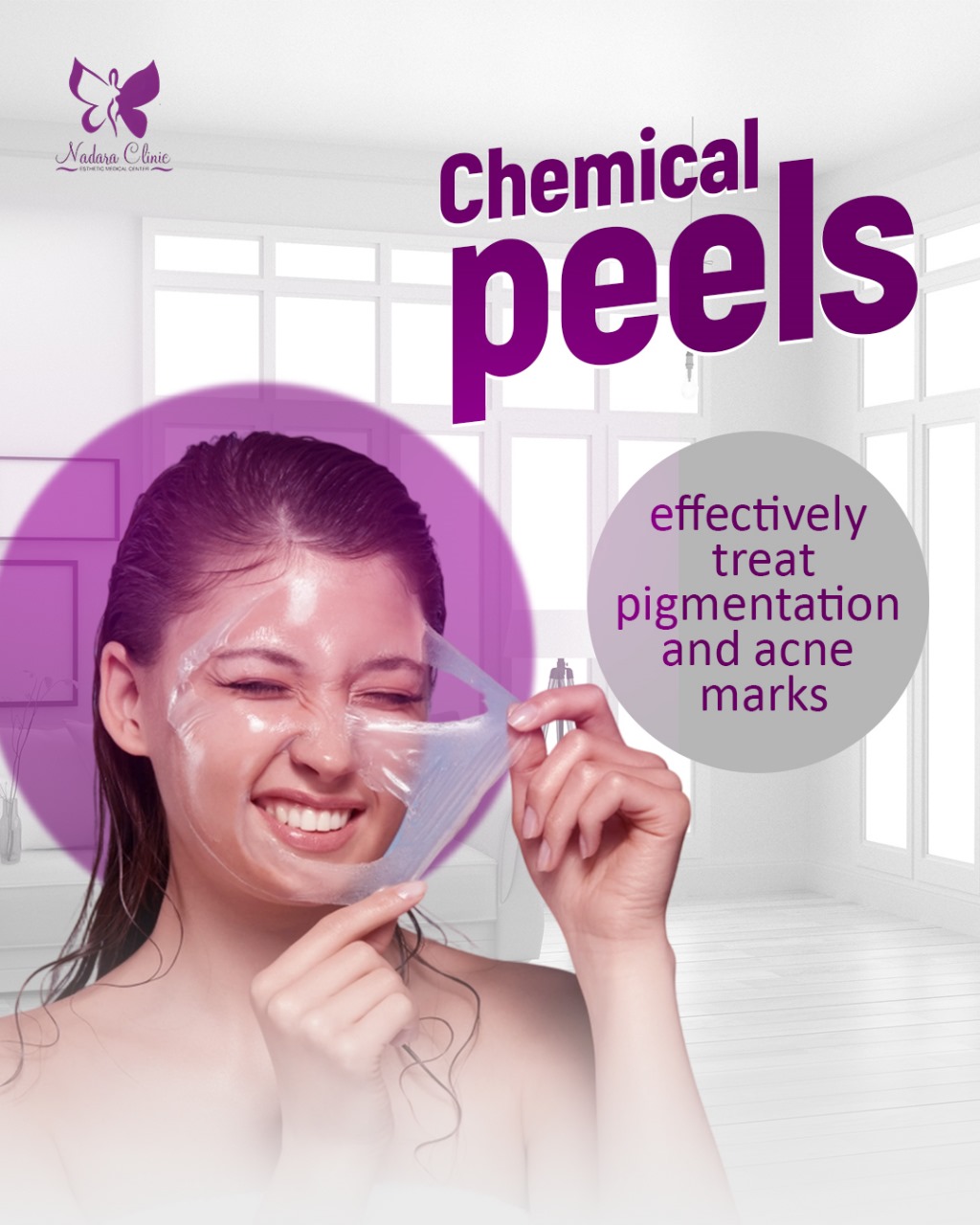Do you wish you could simply exfoliate the signs of aging from your skin? Dermatologists use at Freshness Center for Dermatology, Laser and Cosmetology session Chemical peel To do this, it can reduce many signs of aging on the face, as well as the hands, neck and chest.
What is a chemical peel session?
A chemical peel session is a non-surgical procedure that removes damaged surface skin cells and stimulates the growth of new, healthy skin cells. Peeling is done by applying an acidic solution to the skin for a period of time. This exfoliates the damaged surface skin cells, exposing the mature skin underneath while stimulating the growth of new cells.
The result is a younger and fresher appearance, the type of chemical used and the degree of exfoliation required is determined by the doctor according to your skin type and the desired result.
Types of chemical peel session
There are three different types of exfoliation; Light, medium and deep. While all of these treatments are effective, medium and deep peels can address major concerns and give you more visible results. On the other hand, you can't get as much as you can get light exfoliation.
light
A light chemical peel session can smooth fine wrinkles and reduce the appearance of scars. They are great for reducing the appearance of acne scars and lightening your skin tone. Light exfoliation is done fairly frequently, and is a good part of your regular skincare routine.
medium
A medium peel session goes a little deeper and is effective in removing or minimizing deep wrinkles and facial scars, as the solution penetrates the skin and affects the lower layers of the dermis, resulting in a more visible result. Since it involves deeper penetration, a medium peel can only be done every two months.
deep
A deep peel is the most powerful type of chemical peel you can get, and it can do wonders for very deep wrinkles and scar tissue. You can only have one of these treatments every two years. Although effective, deep exfoliation is more intense than light or medium exfoliation.
Our team at Freshness Center for Dermatology, Laser and Aesthetics in Hurghada can consult with you to determine the best treatment plan for your needs and lifestyle.
Chemical peeling uses
Chemical peels are an effective treatment for many skin conditions, including sun damage, hyperpigmentation and acne, and are also often used to treat melasma, a pigmentation disorder.
Chemical peels also reduce the risk of some types of skin cancer. Chemical peels remove the upper layers of the skin, including the epidermis. According to the Skin Cancer Foundation, chemical peels can be used to treat actinic keratoses, a potentially precancerous lesion that develops due to exposure to sunlight.
How does a chemical peel session work?
Chemical peels work with the help of the acids in the peel that raise the acidity of the skin to about 3.8 pH. Skin's pH is usually around 5.5, and chemically changing the pH level loosens the cells that form the glue between dead skin and healthy skin.
As this bond is chemically loosened, exfoliation occurs where dead skin is removed to reveal healthy skin underneath. This process also promotes the growth of new, healthy skin cells.
Most types of chemical peels contain one of the following two categories of chemical peels:
Alpha hydroxy acids
Alpha hydroxy acids are natural substances derived from foods. For example, citric acid is found in citrus fruits, and lactic acid is found in curd. Exfoliates the skin by loosening the surface layers. AHAs are useful in treating uneven skin tone, scars, hyperpigmentation and acne.
The most common AHAs you may find in a chemical peel include:
- Lactic.
- mandelic
- Malik
- citric
- glycolic
beta hydroxy acid
Beta hydroxy acid is also known as salicylic acid. While alpha hydroxy acids work to break down the surface layers of the skin, beta hydroxy acids work to penetrate the pores of the skin and dissolve oil, dirt and debris in them. This makes BHA effective in fighting acne, oily skin, and other skin irritations.
Who can enjoy the benefits of a chemical peel session?
Anyone can be a great candidate for a chemical peel, but it's best for those who have dull looking skin or who want to get rid of sunspots, wrinkles, or acne. If you're pregnant or breastfeeding, check with your doctor before having one of these sessions, just in case it interferes with your pregnancy. Overall, exfoliation is an exceptionally safe and effective treatment for just about anyone.
You can also read: dry lips"
Preparing for a chemical peel session
To prepare for a chemical peel, stop using any prescription and some anti-aging products at least a week before your scheduled appointment. Products that contain Retin-A or retinol can interfere with exfoliation.
You should also avoid prolonged exposure to the sun if you can help it, and use plenty of sunscreen before exfoliating, as your skin should be in perfect condition before the treatment.
You can also read: Eczema treatment in Hurghada"
What to expect during a chemical peel session?
During a chemical peel session, the solution is applied to your skin with a sponge, then the solution is left on your skin for a period of time, which may be longer or shorter depending on the depth of the peel and the sensitivity of your skin. Next, the solution is washed off your skin, and your skin will be neutralized with a cooling pad.
After a chemical peel, your doctor will review your aftercare instructions to make sure you understand what to expect during your recovery.
Aftercare
The amount of downtime required for a chemical peel depends on the strength of the peel. For example, a superficial peel can take a quick recovery time of less than a week. However, more aggressive peels that treat the deeper layers of the skin may require one to two weeks of healing time. During the recovery period, your skin may become dry, flaky, or irritated. For this reason, we recommend scheduling a chemical peel several weeks in advance of major social events.
When recovering from a chemical peel, your skin will be highly affected byultraviolet rays of the sun. For this reason, it is important to take steps to protect your skin from these harmful rays. We recommend using a sunscreen with at least an SPF of 30, and avoiding the sun when it is at its strongest, between 10am and 4pm.
You can also read: CO2 . fractional laser"
We know that dull skin and the rough texture of facial skin can negatively affect your appearance and make you shy, which is why the dermatologists at Freshness Center for Dermatology, Laser and Cosmetology in Red Sea Governorate offer Chemical Peeling Session To help improve your complexion and rejuvenate your appearance, our practitioners have the skills and experience to perform a chemical peel to get the results you want, and we're also here to address your concerns and questions throughout the entire process.






